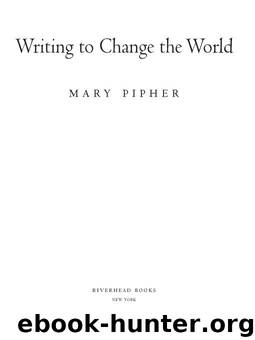Writing to Change the World by Mary Pipher PhD

Author:Mary Pipher, PhD
Language: eng
Format: epub
Publisher: Penguin Publishing Group
Published: 2010-02-28T16:00:00+00:00
Interviews
Interviews and observations are powerful forms of research. I have learned a great deal sitting in on classes at schools, or with elders in nursing home dining rooms. Some of my best ideas have cropped up when I was watching kids and their parents at a church fun night, or picnicking with Kurdish refugees.
While statistical research and control-group studies are published in journals more frequently, the most groundbreaking work often has come from the careful observation of small samples. Freud, Jung, Piaget, and Alice Miller carefully observed individual patients, and these relatively few observations led them to theories about humans in general. Science moves forward because of statistically significant research. But it also moves forward because of observation and eureka moments.
For me, interviewing is not a linear process. I do not gather information and then write a book. I interact with people all the way through the writing process. I advance hypotheses, then conduct interviews to verify them, then develop more sophisticated hypotheses. Starting out, I often conduct some interviews to determine the lay of the land, then, later, other interviews to understand nuances or fill in gaps. Toward the end of a project, I often have more sophisticated and focused questions to explore, so I will schedule a few last-minute interviews to get answers.
Writers can locate interviewees informally, even randomly. We can ask friends for referrals and introductions, be they businesspeople, police officers, or workers in rehab units. Often, we can find people to interview by contacting institutions, taking an ad out in the newspaper, or making a speech about our subject of interest and asking the audience to sign up for interviews. Most people are eager to offer their opinions. We all want to be heard.
While we want to interview a variety of people, soliciting too many stories that make similar points can overwhelm us later with overlapping material. While we want to go into interviews well prepared, we also want to be poised for the spontaneous. We want to know what is unique about our interviewees and yet we want them to answer the same questions we are asking everyone else.
With my books about demographic groups, such as teenagers or the elderly, I ask interviewees if they want me to use their real names, and I honor their preferences. In certain situations, such as when I write about therapy clients, I use composites. It is critical that we report honestly to our readers how we have handled names.
Before we begin our interviews, we need to explain who we are, why we are doing what we are doing, and how our information will be used. We need to discuss confidentiality and release forms. I ask interviewees to look at these forms before the interview but not to decide whether to sign them until after. Sometimes, publishers supply release forms, but I draw up my own, very simple ones.
I never try to coax anyone into participating in an interview. If people have doubts about being interviewed, I withdraw quickly and gracefully.
Download
This site does not store any files on its server. We only index and link to content provided by other sites. Please contact the content providers to delete copyright contents if any and email us, we'll remove relevant links or contents immediately.
Asking the Right Questions: A Guide to Critical Thinking by M. Neil Browne & Stuart M. Keeley(5775)
Autoboyography by Christina Lauren(5235)
Eat That Frog! by Brian Tracy(4540)
Dialogue by Robert McKee(4404)
Sticky Fingers by Joe Hagan(4198)
Journeys Out of the Body by Robert Monroe(3624)
Annapurna by Maurice Herzog(3467)
Full Circle by Michael Palin(3450)
Schaum's Quick Guide to Writing Great Short Stories by Margaret Lucke(3381)
Elements of Style 2017 by Richard De A'Morelli(3349)
The Art of Dramatic Writing: Its Basis in the Creative Interpretation of Human Motives by Egri Lajos(3067)
Atlas Obscura by Joshua Foer(2962)
Why I Write by George Orwell(2953)
The Fight by Norman Mailer(2940)
The Diviners by Libba Bray(2937)
In Patagonia by Bruce Chatwin(2930)
The Mental Game of Writing: How to Overcome Obstacles, Stay Creative and Productive, and Free Your Mind for Success by James Scott Bell(2908)
Venice by Jan Morris(2573)
The Elements of Style by William Strunk and E. B. White(2473)
